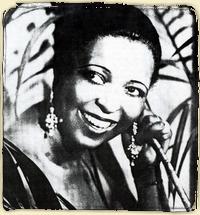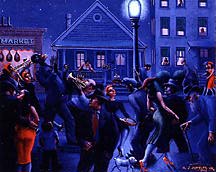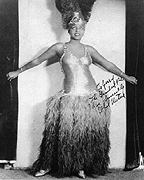
Thanae's Harlem Renaissance Music Page
Introduction : Harlem Renaissance Ethel Waters : Singing Sensation Life as Ethel
Introduction : Harlem Renaissance
The Harlem Renaissance was a movement of coming of age African Americans who wanted to become a part of the American society that had ignored them for so long. African Americans pushed to achieve intellectual and social equality in the American cultural world and did so by using their talents to prove their ability for tremendous work. Music during the time period was of especial importance because of its ability to relate and please the masses of American consumers, both white and black in a land where previously Black music was not heard. Racism was still prevalent during the time even though the white and blacks shared music. Whites were not permitted to converse with the black performers and many times, African Americans were not allowed to attend the dance halls and nightclubs where whites frequented. Jazz was one of the most important musical forms during the Harlem Renaissance and achieved success on a large scale. Jazz came out of other types of music including ragtime and blues. It developed from the African American culture in the south, the spiritual songs of the slaves working in the fields. In Jazz, music is always improvised, never thought out. Jazz includes dissonance, a sound that comes when melody and harmony do not come in concord. Syncopation was also another aspect of jazz during this time period. Syncopation is a rhythm where the weak beats are accented instead of the strong ones. The African American styles influenced a large part of the music during the 1920’s and 30’s. Music is something that has always connected people in whatever way and continued to impact the American culture during the Jazz Era.
Ethel Waters : Singing Sensation
 Ethel Waters was one
of the most popular Blues singers of her time. She first sang in
public at the age of 5 under the name Baby Star in a Philadelphia
church. She was married at 12 and divorced by 14, and then began
working in a hotel. In her young life she was often beaten and
half starved at times, and at the chambermaid job she only made
$5.00 a week. Ethel Waters, in the words of Langston Hughes,
"was one of those people who had survived a dozen
catastrophes that would have killed off whole armies." She
started her career by singing under the name Sweet Mama
Stringbean, because of her tall and lanky figure. She toured with
the Black Swan Jazz Masters, and also starred in several broadway
musicals, such as "Blackbirds of 1930" and
"Rhapsody in Black." Waters version of the song
"stormy weather" became immensely popular and could
also be called the theme song of her life. She was a woman with a
sweet and gentle smile, and a friendly personality which was a
large part of her appeal. Ethel Waters, along with being a very
successful musician, was also an accomplished actress. She was a
devout catholic and adopted 12 children in her lifetime, all who
were needy and she hoped to give a happier start that she herself
had as a child. Ethel Waters was a successful and talented singer
and actress during the Harlem Renaissance movement and Jazz Era.
Ethel Waters was one
of the most popular Blues singers of her time. She first sang in
public at the age of 5 under the name Baby Star in a Philadelphia
church. She was married at 12 and divorced by 14, and then began
working in a hotel. In her young life she was often beaten and
half starved at times, and at the chambermaid job she only made
$5.00 a week. Ethel Waters, in the words of Langston Hughes,
"was one of those people who had survived a dozen
catastrophes that would have killed off whole armies." She
started her career by singing under the name Sweet Mama
Stringbean, because of her tall and lanky figure. She toured with
the Black Swan Jazz Masters, and also starred in several broadway
musicals, such as "Blackbirds of 1930" and
"Rhapsody in Black." Waters version of the song
"stormy weather" became immensely popular and could
also be called the theme song of her life. She was a woman with a
sweet and gentle smile, and a friendly personality which was a
large part of her appeal. Ethel Waters, along with being a very
successful musician, was also an accomplished actress. She was a
devout catholic and adopted 12 children in her lifetime, all who
were needy and she hoped to give a happier start that she herself
had as a child. Ethel Waters was a successful and talented singer
and actress during the Harlem Renaissance movement and Jazz Era.
Ethel Waters made a considerable number of records in her singing career and one of her more bluesy songs "Am I Blue" features lyrics that are relatable to women of the time. This jazzy blues piece features Ethel’s melodious voice and an instrumental band backing her song about a lost love. Ethel sings lyrics such as the chorus of "Am I Blue, Am I Blue, Ain’t these tears in these eyes telling you, am I blue why you’d be too, If each plan with your man done fell through." The repetition of words is classic of jazz pieces especially of the time period. There is also the colloquial language usage in Ethel’s songs to make them more personable and easygoing. Ethel’s voice is rich and clear, singing of her experience about a man who left her. Jazz is a musical conversation, "a partly planned and partly spontaneous musical dialogue among the musicians who are performing it." Jazz is about the feeling, not what defines it. Ethel gives feeling and soul to her song of loneliness. Instead of making the listener feel sad as the title would make one think, the listener feels compelled to feel better and let go of past "blue" feelings by singing along with Ethel. Langston Hughes once said that "the rich warmth of her voice had made audiences all across America feel happy and relieved of their own cares." American people wanted to feel better, not worse, during a time following the Great Depression, and singers and musicians like Ethel Waters helped achieve that for American society.
